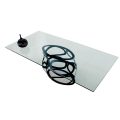In fact, the problem of trash is more ambitious thanwe imagine. A mess in a house means that the same thing is going on inside a person: old and broken things clutter up the living space, an emotional burden pulls down into sadness and depression, and then problems with interpersonal relationships that bring with them resentment, anger and feeling the guilt. The last element of the puzzle is work, responsibilities and social roles: if there is confusion, then the person has nowhere to take the energy, motivation and strength to go to the dream or just enjoy every day. Fortunately, the trash is not only necessary, but can be sorted out. It is quite capable of everyone, and especially women, who have enough experience in such matters. Photo: Getty
Photo: Getty
Nature of trash
Everyone knows the feeling when you look atthe mess and you feel with your skin how you don’t want to dive into it. The instinctive reaction is to push the old stuff far away in the closet, promise yourself to come up with something tomorrow (in a week, a month, a year) and run. Run without looking back. Run until you run out of strength. And although 99% of people feel negative about the mess, we are puzzled where it all comes from. How can a person who hates all kinds of junk so much bring it into the house? The question is rhetorical. Perhaps, the point is that people by their nature are inclined to fill empty space. This is an urgent need. When there is a minimum of furniture, kitchen utensils, all kinds of tools and other things in the house, it seems empty to us. And we rather rush to bring home new things so that it seems cozy and full. But the fact is that, trying to create a comfortable space, we, on the contrary, clutter it. Many are sure that empty walls should be decorated with paintings. Fill the silence with empty talk. Fill the empty cells of the calendar with tasks. However, this rarely leads to a positive result. Another theory grows out of the socio-cultural context. Our society and culture do not accept emptiness, as it is associated with many phenomena that are not very pleasant for a modern person: financial difficulties, depression, fear and anxiety, lack of mental resources (if you could not earn money, it means you did not have enough brains or, for example, perseverance to graduate from university), loneliness (where can you be alone when there are extroverts all around!). However, mountains of junk block the sunlight and do not allow you to consciously look at yourself. People live for years among unnecessary things, tasks and relationships, and then are surprised that this very life does not bring them anything good. But out of order, broken, unnecessary and unloved objects only bring harm. Eventually, the house becomes an unsuitable place for normal living. And finally, the last scenario: complicating life through simplification. We live in a consumer society: this culture is imposed by advertising and manufacturers of all kinds of electronics. Today, you can choose equipment to suit any taste, which will help you with household chores and at work. But the fact is that gadgets designed to save time steal it from us. All these cutters, cleaners, steamers, holders and storage boxes take away precious minutes, because we are forced to wade through them in search of what we need. These objects absorb not only physical space and time, but also energy. They prevent you from enjoying your own home, coziness and comfort.









